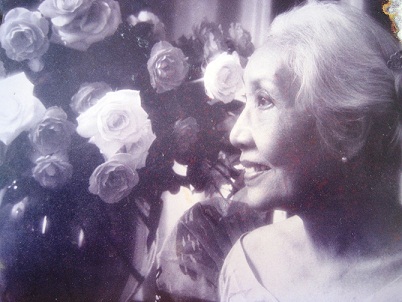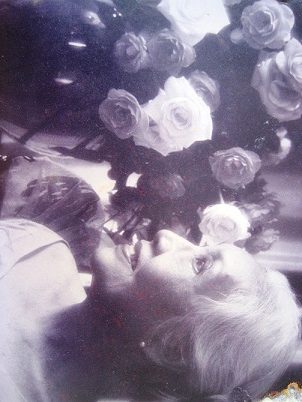By ELIZABETH LOLARGA
SHE was everybody’s “Ayi”, a Chinese word for “aunt” that stuck to her at the height of the anti-Marcos dictatorship years when she was considered a rallying symbol. She was a vocal champion of human rights, especially those of political prisoners, children, women and other vulnerable sectors.
One of her grandchildren, Machel, remembered Paula Carolina S. Malay as deceptively elegant, garbed in an ultra-feminine Maria Clara but nursing the ferocity of a Gabriela Silang.
Her consistencies and contradictions are preserved in the slim book, Paula’s Book. Put out by her family and Central Book Supply Inc., these selected writing of Paula Carolina Santos Malay covers several decades.
In the early ’50s, she wrote an anonymous column called “Dear Daughter” and the occasional freelance article, usually on a historical subject, in magazines.
She was a fulltime homemaker who would guiltily play Beethoven’s “Eroica” at mid-morning when other family members had left the house for office or school. She concerned herself with sundry matters like if she had paid and treated a boy gardener justly, why rhumba band leader Xavier “king” Cugat was getting more press notices than classical musicians Menuhin and Traubel, ruining husband Armando’s suit when she put it in the washing machine instead of sending it to the cleaners as instructed (she was trying to save money), musing about the bathtime rituals of old when gugo and calamansi were used instead of shampoo and soap or undertaking a taste test with her kids to find out whether or not butter was superior to margarine.
But Malay broke from that stereotypical mold and “grew with her times, driven into new ideas and ideals along with the rest of Philippine society,” as the book’s blurb put it. Her children were politicized and became activists. Dick went into long exile in communist China; daughter Bobbie joined and remained in the underground movement for close to two decades before her arrest and imprisonment. She witnessed Bobbie and Satur Ocampo wed at revolutionary rites and remembered to cook a delicious chicken pastel to mark the occasion.
Eldest son Badi described his mother as someone who couldn’t bear being idle at home, in life and everywhere else. What Bobbie called “unruly” emotions found expression in the progressive causes she espoused.
When she became a mother again (she and her husband became the guardians of Bobbie and Satur’s two children while they were underground), she began translating from turn-of-the-century Tagalog to English Katipunero Santiago Alvarez’s memoirs of the Revolution. She did this while waiting for granddaughter Silahis to come out of school or after her home and garden chores.
She resumed her “Dear Daughter” column for a weekly under her byline and this time showing an expanded consciousness. She allowed herself to sound nostalgic for the fading scent of pine in Baguio, for the company of poet Amado V. Hernandez who, while they were attending a writers’ conference, shared with her anecdotes about a past love or how he showered Atang de la Rama with sampaguita after every performance.
Her eye for detail infused another nostalgia piece on Escolta, the street of the smart set in the mid-’20s and ’30s. She described how people were sartorially outfitted during that era called peacetime: “The dandies wore white linen suits and occasionally, alpaca jackets. The accessories worn were tie pins, watch fobs dangling from their pocket watches, handkerchiefs tucked in breast pockets, and butonnieres of fresh flowers. They doffed their hats to friends and acquaintances, especially pretty women. The younger girls were chic in flapper frocks and seamed silk stockings.”
 In her sunset years, she was still deeply involved in “NGOs, that superb form of organization that proliferates in oppressed societies.” Implied here was they addressed national issues better than the tea parties hosted by women’s clubs in her early years. Unflinchingly, she called attention to the forms of violence suffered by marginalized Filipino children—from the sakadas’ children who add to their fathers’ wages as soon as they could tell between grass and sugarcane to the prostitution of minors to serve unbridled tourism.
In her sunset years, she was still deeply involved in “NGOs, that superb form of organization that proliferates in oppressed societies.” Implied here was they addressed national issues better than the tea parties hosted by women’s clubs in her early years. Unflinchingly, she called attention to the forms of violence suffered by marginalized Filipino children—from the sakadas’ children who add to their fathers’ wages as soon as they could tell between grass and sugarcane to the prostitution of minors to serve unbridled tourism.
The book also showed her facility in Filipino. She used it in expressing her thoughts on graceful but meaningful aging (use your head, stretch your bones and muscles to help others). She narrated how Bobbie taught her to value and use the national language after the latter spoke on a Parisian street and someone who overheard her asked, “Don’t you have a language of her own?”
In the section “Testimonies from Family and Friends,” Gilda Cordero Fernando wrote: “I admired Ayi because she exuded peace and seemed to know what she wanted out of life. She wanted a good fight, and she wanted to be a symbol, and she wanted a big kiss. And she got all that.”
